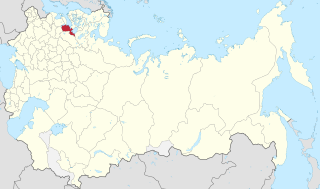Related Research Articles

The Saint Petersburg Governorate was a governorate of the Russian Empire, with its administrative centre in Saint Petersburg. The governorate was composed of 44,613 square kilometres (17,225 sq mi) of area and 2,112,033 inhabitants. The Saint Petersburg Governorate was bordered by the Estonian and Livonian Governorates to the west, the Pskov Governorate to the south, the Novgorod Governorate to the east, the Olonets Governorate to the northeast, and the Vyborg Governorate of the Grand Duchy of Finland to the north. The governorate covered most of the areas of modern Leningrad Oblast and Ida-Viru, Jõgeva, Tartu, Põlva, and Võru counties of Estonia.

Komkor is the abbreviation for corps commander, and was a military rank in the Soviet Armed Forces of the USSR in the period from 1935 to 1940. It was also the designation for officers appointed to command a corps sized formation.
The leaders of the Russian Civil War listed below include the important political and military figures of the Russian Civil War. The conflict, fought largely from 7 November 1917 to 25 October 1922, was fought between numerous factions, the two largest being the Bolsheviks and the White Movement. While the Bolsheviks were centralized under the administration of the Russian Soviet Federative Socialist Republic and the Russian Communist Party (Bolsheviks), led by Vladimir Lenin, along with their various satellite and buffer states, the White Movement was more decentralized, functioning as a loose confederation of anti-Bolshevik forces united only in opposition to their common enemy - though from September 1918 to April 1920, the White Armies were nominally united under the administration of the Russian State, when, for nearly two years, Admiral Alexander Kolchak served as the overall head of the White Movement and as the internationally recognized Head of State of Russia. In addition to the two primary factions, the war also involved a number of third parties, including the anarchists of the Revolutionary Insurgent Army of Ukraine, and the non-ideological Green Armies.
References
- Shkadov, Ivan (1987). Герои Советского Союза: краткий биографический словарь I, Абаев - Любичев [Heroes of the Soviet Union: A Brief Biographical Dictionary] (in Russian). Moscow: Voenizdat.
- "Проект "Герои Страны"" [Heroes of the Country] (in Russian).
- Russian Ministry of Defence Database «Подвиг Народа в Великой Отечественной войне 1941—1945 гг.» [Feat of the People in the Great Patriotic War 1941-1945] (in Russian).
